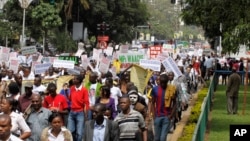NAIROBI —
Riot police in Kenya fired teargas and water cannons Tuesday to disperse more than 200 demonstrators gathered outside parliament to protest a push by legislators to raise their salaries, as the national economy struggles.
Kenyan protesters denounced newly-elected members of parliament for burdening ordinary citizens by asking for a pay raise before taking up important legislative work.
Demonstrators poured animal blood at the gate of the parliament building and brought dozens of pigs to feed on the blood, symbolizing the greed of the Kenyan lawmakers.
One protester, Fredrick Odol, said if the lawmakers are not satisfied with what they are paid they should resign.
“I am demonstrating basically because we are refusing hefty payment to the parliamentarians," said Odol. "We consider it as greed and we are telling them if they cannot accept the payment they are given by the salary and remuneration commission they should resign. We are not desperate for leaders.”
On March 4, the salary and remuneration commission revised lawmakers’ salaries down from $10,240 to $6,400 per month.
In reaction, members of parliament called for disbanding the commission, which was established in 2011 to set pay rates for public officers.
Another protester, Michele Emali, a third year student at the University of Nairobi, says the voters are to be blamed for electing such leaders into office.
“We should blame ourselves as Kenyans because we are the ones who voted for the MP’s and we were advised to vote wisely, which we did not," said Emali.
Human rights lawyer Harun Ndubi says members of parliament have fallen into the habit of increasing their salaries as they wish.
“Parliament has been the only public institution that has been regulating and determining its own salaries contrary to public expectations, contrary to public policy, and therefore this is the expression of people’s anger," said Ndubi.
The previous parliament also attempted to raise its salaries and award themselves retirement perks before leaving office earlier this year. The move was vetoed by outgoing president Mwai Kibaki.
Newly-elected President Uhuru Kenyatta, in his first address to the parliament last month, expressed concern the cost of public wages is too high, and stated his desire to bring it down.
Kenya spends 12 percent of gross domestic product on public wages.
Kenyan protesters denounced newly-elected members of parliament for burdening ordinary citizens by asking for a pay raise before taking up important legislative work.
Demonstrators poured animal blood at the gate of the parliament building and brought dozens of pigs to feed on the blood, symbolizing the greed of the Kenyan lawmakers.
One protester, Fredrick Odol, said if the lawmakers are not satisfied with what they are paid they should resign.
“I am demonstrating basically because we are refusing hefty payment to the parliamentarians," said Odol. "We consider it as greed and we are telling them if they cannot accept the payment they are given by the salary and remuneration commission they should resign. We are not desperate for leaders.”
On March 4, the salary and remuneration commission revised lawmakers’ salaries down from $10,240 to $6,400 per month.
In reaction, members of parliament called for disbanding the commission, which was established in 2011 to set pay rates for public officers.
Another protester, Michele Emali, a third year student at the University of Nairobi, says the voters are to be blamed for electing such leaders into office.
“We should blame ourselves as Kenyans because we are the ones who voted for the MP’s and we were advised to vote wisely, which we did not," said Emali.
Human rights lawyer Harun Ndubi says members of parliament have fallen into the habit of increasing their salaries as they wish.
“Parliament has been the only public institution that has been regulating and determining its own salaries contrary to public expectations, contrary to public policy, and therefore this is the expression of people’s anger," said Ndubi.
The previous parliament also attempted to raise its salaries and award themselves retirement perks before leaving office earlier this year. The move was vetoed by outgoing president Mwai Kibaki.
Newly-elected President Uhuru Kenyatta, in his first address to the parliament last month, expressed concern the cost of public wages is too high, and stated his desire to bring it down.
Kenya spends 12 percent of gross domestic product on public wages.




